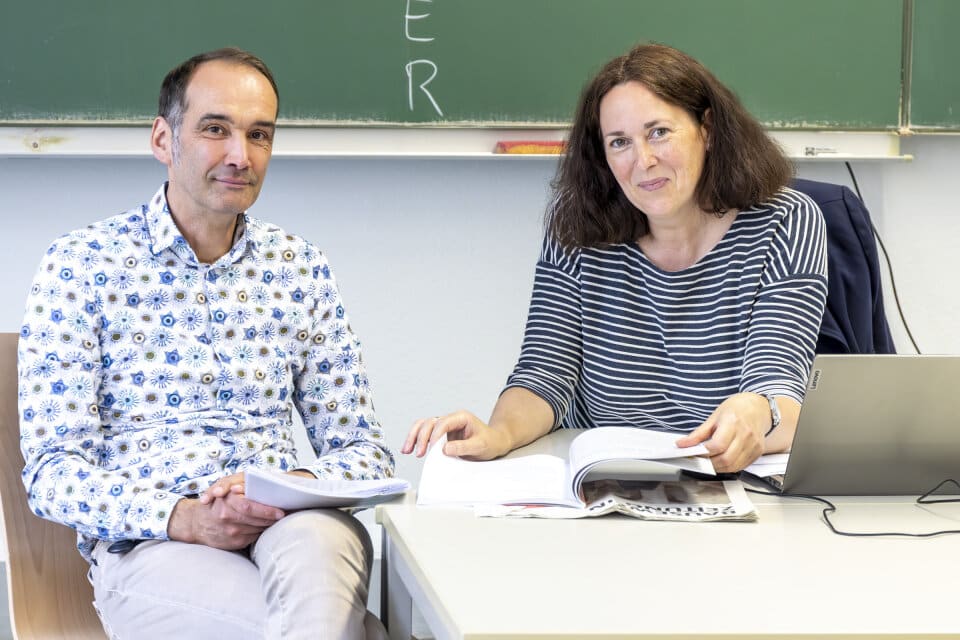Basic education courses enable participation in social life
Buying a ticket from a machine, transferring money via online banking or simply finding out about a term or current events on your cell phone - what is self-evident for most people is a big hurdle for people who have difficulty reading and writing. “When it comes to basic education, it is only partly about reading and writing,” says Andreas Dölle, head of the languages department at the Erfurt adult education center. “It’s also about other skills: dealing with media and modern technology, for example, knowing how to handle money, knowledge of geography and much more.”
Two courses entitled “Reading and Writing” are currently running at the adult education center. Once a week, for 90 minutes each, participants are taught basic skills. While Levels 1 and 2 focus on the syllable and ultimately word level, the learning content in the course for Levels 3 and 4 is on the sentence and text level. The target group is people whose native language is German and who cannot read and write sufficiently well. Since 2021, the courses have been led by Anne-Sophie Gozé-Diemar, who is a full-time teacher.
“Everyone can read!”
A question that illiterate people are often confronted with: How can it be that they cannot read and write - despite having a school qualification, despite having a job? “Many passed exams because the teachers turned a blind eye,” says Anne-Sophie Gozé-Diemar. “Often people then, many of them back in the GDR era, completed training at a low level and then worked in this profession. Sometimes reading was forgotten again in everyday practical life.” The lecturer cannot confirm the prejudice that illiterate people are uneducated. “They have to memorize a lot and develop strategies so that they don't get 'caught,'” she says. They often receive support - consciously or unconsciously: from their sister who opens the letters at home, from a colleague who fills out vacation applications at work, from the government employee who helps out because they "forgot their glasses at home".
But digitalized everyday life is becoming increasingly difficult to cope with without reading and writing. “These people often accept worse things than admitting that they can’t read or write,” reports Andreas Dölle. “It's usually quite by chance that you find out that someone has problems with it.” For example, when avoidance strategies are noticed: the bad eyesight, the bandaged arm that prevents you from filling out a form - or that it is taken home and not filled out on site . “Then it requires a particularly sensitive approach,” says Dölle. “It is therefore important that contact persons at the relevant control points are vigilant, but also that people they trust are sensitized.” These are an important support for people who cannot read and write properly. “Very few course participants come on their own; they are often accompanied by someone close to them, at least the first time,” reports the head of the department.
Thematic orientation towards everyday life
In addition to the regular reading in the reading and writing courses, participants can request topics. The local elections in Thuringia have been an important topic in recent weeks. “The content of political education is important,” says Anne-Sophie Gozé-Diemar. “We worked with the ballot papers, looked at which parties there are and discussed the differences between federal and local politics.” You can also practice writing very practically when it comes to politics: “For example, by writing a letter to the mayor, if you are not satisfied with something,” says the lecturer. “We also wrote a letter to the Federal President together as part of a competition run by the Federal Association for Literacy and Basic Education. This made the participants proud because they were able to show that they act as a group and are capable of something.”
More independence and growing self-confidence are among the individual successes of the course. “Many people often don’t see the opportunities to get involved and feel excluded in everyday life,” says Gozé-Diemar. “For example, we organize trips to the library or the museum and show: This all belongs to us all and we can benefit from it.” The sense of achievement also motivates the lecturer: “The participants are happy when they understand more words, read more fluently, they “Write my first small texts, for example for the ABC newspaper of the VHS Oldenburg,” says Gozé-Diemar. “A course participant recently went to Salzburg with a group – before he only rode his bike and didn’t even dare to leave his neighborhood.”
Courses have free capacity
“Based on the numbers, we should be beaten down,” says Andreas Dölle. But there are currently only twelve participants in the courses. Networking is all the more important for the Erfurt Adult Education Center - for example with the multi-generational house on Moscower Platz, where a literacy project run by the Mitmensch association, the Caritas Association and the Thüringer Wirtschaft educational organization. “We go to institutions where we think there might be people with reading and writing problems and sensitize the respective contact persons there,” says Dölle.
Anyone who has difficulty reading or writing or would like advice can contact the adult education center directly - by phone on 0361 655-2965, by email at volkshochschule@erfurt.de or in person at Schottenstraße 7. “We can help further. “Not everyone wants to take part in a course, but there are other options,” says Dölle.
The Thuringian basic education hotline 0800 8989789 is also available for those interested. Further offers for basic education in Erfurt and throughout Thuringia can be found at www.hier-lerne-ich.de .
Source: Current reports from the state capital Erfurt
